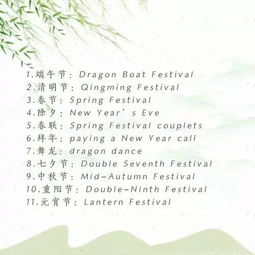中国传统文化节日英语作文
The Lantern Festival marks the end of the Spring Festival celebrations, occurring on the 15th day of the first lunar month. It's characterized by colorful lantern displays, lion dances, and the eating of tangyuan (sweet rice dumplings).
The MidAutumn Festival, also known as the Mooncake Festival, falls on the 15th day of the eighth lunar month. It's a time for family gatherings, appreciating the full moon, and enjoying delicious mooncakes. The festival is also associated with the legend of Chang'e, the Moon Goddess.
The Dragon Boat Festival, held on the fifth day of the fifth lunar month, commemorates the ancient poet Qu Yuan and involves dragon boat races, zongzi (sticky rice dumplings), and the hanging of aromatic herbs to ward off evil spirits.
Translation of Chinese Traditional Festivals into English
Chinese traditional festivals are deeply rooted in the country's rich cultural heritage, spanning thousands of years of history. When translating these festivals into English, it's essential to convey not only their literal meanings but also their cultural significance. Let's explore the English translations of some prominent Chinese traditional festivals:
TombSweeping Day, also known as Qingming Festival, is a time for paying respects to ancestors by cleaning their graves and making offerings. It usually falls on April 4th or 5th and is also a time for outdoor activities such as flying kites and enjoying the spring scenery.
The Spring Festival, also known as Chinese New Year, marks the beginning of the lunar new year in China. It's the most important and widely celebrated festival in Chinese culture, characterized by family reunions, feasting, fireworks, and the iconic red decorations symbolizing luck and prosperity.
When translating these festivals into English, it's important to capture their cultural essence while ensuring clarity and accuracy. Additionally, providing cultural context can enhance understanding and appreciation for these traditional celebrations.
Remember, language is not just about words; it's a bridge that connects cultures and histories.

The Double Ninth Festival, observed on the ninth day of the ninth lunar month, is a time for climbing mountains, appreciating chrysanthemums, and drinking chrysanthemum wine. It's also known as Senior Citizens' Day, emphasizing respect for the elderly.
The Laba Festival, celebrated on the eighth day of the 12th lunar month, marks the beginning of preparations for the Spring Festival. It's a time for eating Laba porridge, a nutritious dish made from mixed grains and beans, and promoting good fortune for the coming year.
本文 新鼎系統网 原创,转载保留链接!网址:https://acs-product.com/post/20625.html
免责声明:本网站部分内容由用户自行上传,若侵犯了您的权益,请联系我们处理,谢谢!联系QQ:2760375052 版权所有:新鼎系統网沪ICP备2023024866号-15








